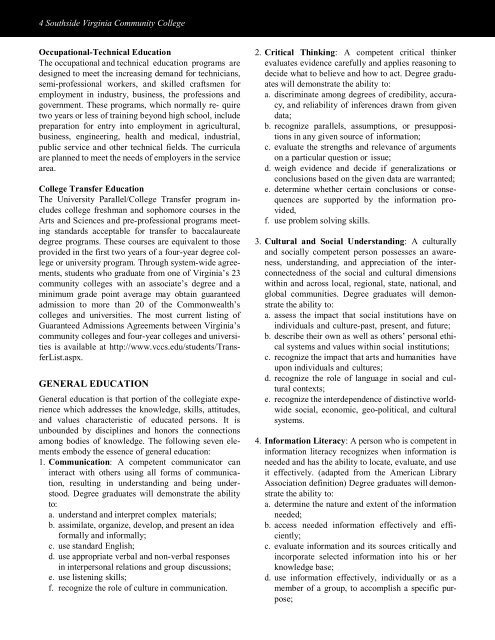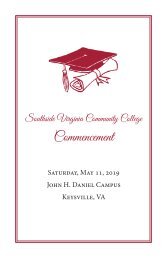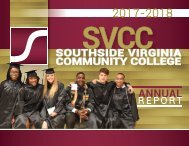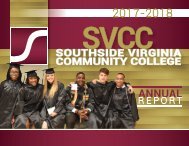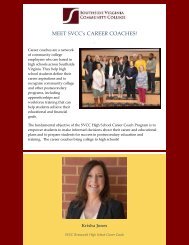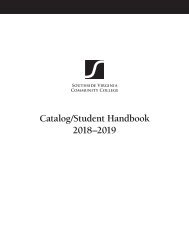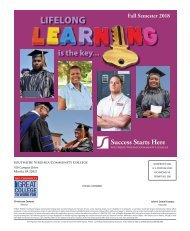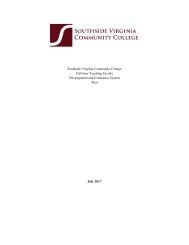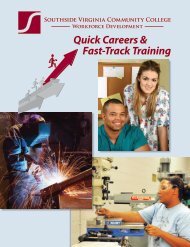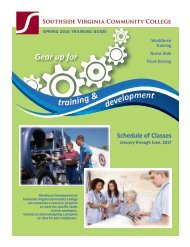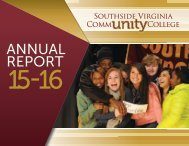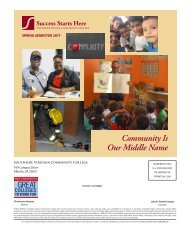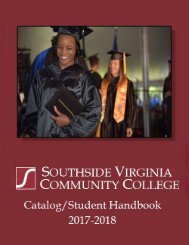SVCC Catalog/Handbook 2017-2018
You also want an ePaper? Increase the reach of your titles
YUMPU automatically turns print PDFs into web optimized ePapers that Google loves.
4 Southside Virginia Community College<br />
Occupational-Technical Education<br />
The occupational and technical education programs are<br />
designed to meet the increasing demand for technicians,<br />
semi-professional workers, and skilled craftsmen for<br />
employment in industry, business, the professions and<br />
government. These programs, which normally re- quire<br />
two years or less of training beyond high school, include<br />
preparation for entry into employment in agricultural,<br />
business, engineering, health and medical, industrial,<br />
public service and other technical fields. The curricula<br />
are planned to meet the needs of employers in the service<br />
area.<br />
College Transfer Education<br />
The University Parallel/College Transfer program includes<br />
college freshman and sophomore courses in the<br />
Arts and Sciences and pre-professional programs meeting<br />
standards acceptable for transfer to baccalaureate<br />
degree programs. These courses are equivalent to those<br />
provided in the first two years of a four-year degree college<br />
or university program. Through system-wide agreements,<br />
students who graduate from one of Virginia’s 23<br />
community colleges with an associate’s degree and a<br />
minimum grade point average may obtain guaranteed<br />
admission to more than 20 of the Commonwealth’s<br />
colleges and universities. The most current listing of<br />
Guaranteed Admissions Agreements between Virginia’s<br />
community colleges and four-year colleges and universities<br />
is available at http://www.vccs.edu/students/TransferList.aspx.<br />
GENERAL EDUCATION<br />
General education is that portion of the collegiate experience<br />
which addresses the knowledge, skills, attitudes,<br />
and values characteristic of educated persons. It is<br />
unbounded by disciplines and honors the connections<br />
among bodies of knowledge. The following seven elements<br />
embody the essence of general education:<br />
1. Communication: A competent communicator can<br />
interact with others using all forms of communication,<br />
resulting in understanding and being understood.<br />
Degree graduates will demonstrate the ability<br />
to:<br />
a. understand and interpret complex materials;<br />
b. assimilate, organize, develop, and present an idea<br />
formally and informally;<br />
c. use standard English;<br />
d. use appropriate verbal and non-verbal responses<br />
in interpersonal relations and group discussions;<br />
e. use listening skills;<br />
f. recognize the role of culture in communication.<br />
2. Critical Thinking: A competent critical thinker<br />
evaluates evidence carefully and applies reasoning to<br />
decide what to believe and how to act. Degree graduates<br />
will demonstrate the ability to:<br />
a. discriminate among degrees of credibility, accuracy,<br />
and reliability of inferences drawn from given<br />
data;<br />
b. recognize parallels, assumptions, or presuppositions<br />
in any given source of information;<br />
c. evaluate the strengths and relevance of arguments<br />
on a particular question or issue;<br />
d. weigh evidence and decide if generalizations or<br />
conclusions based on the given data are warranted;<br />
e. determine whether certain conclusions or consequences<br />
are supported by the information provided,<br />
f. use problem solving skills.<br />
3. Cultural and Social Understanding: A culturally<br />
and socially competent person possesses an awareness,<br />
understanding, and appreciation of the interconnectedness<br />
of the social and cultural dimensions<br />
within and across local, regional, state, national, and<br />
global communities. Degree graduates will demonstrate<br />
the ability to:<br />
a. assess the impact that social institutions have on<br />
individuals and culture-past, present, and future;<br />
b. describe their own as well as others’ personal ethical<br />
systems and values within social institutions;<br />
c. recognize the impact that arts and humanities have<br />
upon individuals and cultures;<br />
d. recognize the role of language in social and cultural<br />
contexts;<br />
e. recognize the interdependence of distinctive worldwide<br />
social, economic, geo-political, and cultural<br />
systems.<br />
4. Information Literacy: A person who is competent in<br />
information literacy recognizes when information is<br />
needed and has the ability to locate, evaluate, and use<br />
it effectively. (adapted from the American Library<br />
Association definition) Degree graduates will demonstrate<br />
the ability to:<br />
a. determine the nature and extent of the information<br />
needed;<br />
b. access needed information effectively and efficiently;<br />
c. evaluate information and its sources critically and<br />
incorporate selected information into his or her<br />
knowledge base;<br />
d. use information effectively, individually or as a<br />
member of a group, to accomplish a specific purpose;


